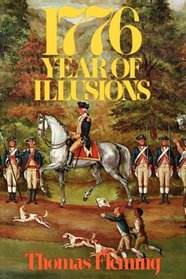This is a long (35 chapters) and well-researched tome, written in an easily understandable style, and well worth reading even if it is kept on the bedside table and not finished for months. I didn't read this when it was written 40 years ago and found it in a box of books courtesy of our JWV post, read it on bus rides for three weeks, and was delighted when it was immediately taken by someone when I put it on the shelf at the old soldiers' home (we have few readers).
The year opened very hopefully, with the British holding only Boston, a few posts in Florida, and under siege in Quebec and ended with Washington hard pressed to preserve his army. Fleming discusses the dark side of 1776 as well as the upsides and urges Americans in 1976 to accept our failings today "without losing hope or faith in the future (481)." Of special interest is the efforts of Admiral Lord Howe to not completely squash the rebel army lest a very hard rule be imposed on the colony as Lord Germain and others in the British government desired. There are succinct descriptions of the English society and politics of the time, and how that led to the policy of the government.
Readers are reminded of how little revenue the British were demanding per capita from the colonists. We all remember John Adams saying one third of colonialists were Loyalists, one third Rebels, and one third rather indifferent, but the dilemma of making this decision as events of 1776 forced it on many people is conveyed to us. There are many insights for Americans who covered this in fifth, eighth, and eleventh grades, as well as in junior college. For example, I had forgotten the the Continental currency held its value pretty well throughout the year and didn't realize (given what Canadians say today) how our forces in Canada could have won the day given some hard money and fewer anti-Catholic chaplains.
This book would serve well in a reading classroom in the 11th grade, with 35 different students each having a chance to share their chapter with the whole class for a few minutes. Includes endnotes, bibliography, and index.
The year opened very hopefully, with the British holding only Boston, a few posts in Florida, and under siege in Quebec and ended with Washington hard pressed to preserve his army. Fleming discusses the dark side of 1776 as well as the upsides and urges Americans in 1976 to accept our failings today "without losing hope or faith in the future (481)." Of special interest is the efforts of Admiral Lord Howe to not completely squash the rebel army lest a very hard rule be imposed on the colony as Lord Germain and others in the British government desired. There are succinct descriptions of the English society and politics of the time, and how that led to the policy of the government.
Readers are reminded of how little revenue the British were demanding per capita from the colonists. We all remember John Adams saying one third of colonialists were Loyalists, one third Rebels, and one third rather indifferent, but the dilemma of making this decision as events of 1776 forced it on many people is conveyed to us. There are many insights for Americans who covered this in fifth, eighth, and eleventh grades, as well as in junior college. For example, I had forgotten the the Continental currency held its value pretty well throughout the year and didn't realize (given what Canadians say today) how our forces in Canada could have won the day given some hard money and fewer anti-Catholic chaplains.
This book would serve well in a reading classroom in the 11th grade, with 35 different students each having a chance to share their chapter with the whole class for a few minutes. Includes endnotes, bibliography, and index.




